Cabaret
Musical (1966) - Top
Inspiration historique: Montée du nazisme en Allemagne
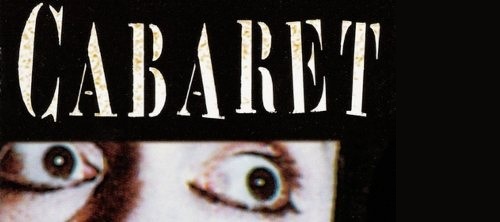
Set in 1931 Berlin as the Nazis are rising to power, it focuses on nightlife at the seedy Kit Kat Klub and revolves around the 19-year-old English cabaret performer Sally Bowles and her relationship with the young American writer Cliff Bradshaw.
A sub-plot involves the doomed romance between German boarding house owner Fräulein Schneider and her elderly suitor Herr Schultz, a Jewish fruit vendor. Overseeing the action is the Master of Ceremonies at the Kit Kat Klub which serves as a constant metaphor for the tenuous and threatening state of late Weimar Germany throughout the show.
Sandy Wilson, who had achieved success with The Boy Friend in the 1950s, had completed the book and most of the score for Goodbye to Berlin, his musicalization of I Am a Camera, when he discovered producer David Black's option on both the 1951 Van Druten play and its source material by Christopher Isherwood had lapsed and been acquired by Harold Prince. Prince commissioned Joe Masteroff to work on the book, and when the two men agreed Wilson's score failed to capture the essence of late-1920s Berlin, John Kander and Fred Ebb were invited to join the project. The new version was initially a dramatic play preceded by a prologue of songs describing the Berlin atmosphere from various points of view. As the composers began to distribute the songs between scenes, they realized the story could be told in the structure of a more traditional book musical, and they replaced some of the songs with tunes more relevant to the plot. Isherwood's original characters began to change as well. The male lead became an American writer who teaches English; the anti-Semitic landlady was transformed into a tolerant woman with a Jewish beau, Herr Schultz, who owned a fruit store; two language students were eliminated; and two loathsome but integral characters - prostitute Fräulein Kost and Nazi Ernst Ludwig - were added to the mix. The musical ultimately became two separate stories in one, the first a revue centered on the decadence of the seedy Kit Kat Klub, the second a story set in the real world in which the club existed.
After seeing one of the last rehearsals before the company headed to Boston for the pre-Broadway run, Jerome Robbins suggested the musical sequences outside the cabaret be eliminated. Although Prince ignored his advice, Bob Fosse did just that when he directed the film adaptation. In Boston, Jill Haworth struggled with her characterization of cabaret performer Sally Bowles. She was a blonde dressed in a white dress that suggested senior prom more than tawdry nightclub. Prince's staging was unusual for the time. As the audience filled the theater, the curtain was already up, revealing a stage containing nothing but a large mirror reflecting the auditorium. There was no overture; instead, a drum roll and cymbal crash led into the opening number. The juxtaposition of dialogue scenes with songs used as exposition and separate cabaret numbers providing social commentary was a novel concept that initially startled the audience, but as they gradually came to understand the difference between the two, they were able to accept the reasoning behind them.
Original Broadway Production)
After 21 previews, the original Broadway production, directed by Harold Prince and choreographed by Ron Field, opened on November 20, 1966 at the Broadhurst Theatre, eventually transferring first to the Imperial and then the Broadway before finally completing its 1,165-performance run. The cast included Jill Haworth as Sally, Bert Convy as Cliff, Lotte Lenya as Fräulein Schneider, Jack Gilford as Herr Schultz, Joel Grey as the Emcee, Edward Winter as Ernst and Peg Murray as Fräulein Kost. Replacements later in the run included Anita Gillette and Melissa Hart as Sally, Ken Kercheval and Larry Kert as Cliff, and Martin Ross as the Emcee.
Original London Production
The first West End production opened on February 28, 1968 at the Palace Theatre with Judi Dench as Sally, Barry Dennen as the Emcee, Lila Kedrova as Fräulein Schneider and Peter Sallis as Herr Schultz. It ran for 336 performances.
1986 London Revival
In 1986, the show was revived in London at the Strand Theatre starring Kelly Hunter as Sally, Peter Land as Cliff and Wayne Sleep as the Emcee directed and choreographed by Gillian Lynne.
1987 Broadway Revival
The first Broadway revival opened on October 22, 1987, with direction and choreography once again by Prince and Field. The revival opened at the Imperial Theatre, eventually transferring to the Minskoff to complete its 261-performance run. Joel Grey received star billing as the Emcee, with Alyson Reed as Sally, Gregg Edelman as Cliff, Regina Resnik as Fräulein Schneider, Werner Klemperer as Herr Schultz. and David Staller as Ernst Ludwig. The song "Don't Go" was added for Cliff's character.
1993 London revival
In 1993, Sam Mendes directed a new production of the show for the Donmar Warehouse in London's West End. It starred Jane Horrocks as Sally, Adam Godley as Cliff, Alan Cumming as the Emcee and Sara Kestelman as Frau Schneider. Cumming received an Olivier Award nomination for his performance and Kestelman won the Olivier for Best Supporting Performance in a Musical. Mendes' conception was a very different show from either the original production or the rather conventional first revival. The most significant change was the character of the Emcee. The role, as played by Joel Grey, in both prior incarnations, was an asexual, malevolent character in a tuxedo with rouged cheeks. Alan Cumming's portrayal was highly sexualized, wearing suspenders (i.e. braces) around his crotch and red paint on his nipples. The cabaret number "Two Ladies" was staged with the Emcee, a cabaret girl, and a cabaret boy in drag and included a shadow play simulating various sexual positions.
The score was entirely re-orchestrated, utilizing synthesizer effects and expanding the stage band, with all the instruments now being played by the cabaret girls and boys. The brutally satiric "Sitting Pretty", with its mocking references to deprivation, despair and hunger, was eliminated entirely, as it had been in the film version, and replaced with "Money". "I Don't Care Much", which was cut from the original production, was reinstated, and "Mein Herr" and "Maybe This Time", written for the film adaptation, were added to the score.[5] Staging details differed as well; instead of "Tomorrow Belongs To Me" being performed by a male choir, the Emcee plays a recording of a boy soprano singing it. Most dramatic of all was in the final scene in which the Emcee removes his outer clothes to reveal a striped suit of the type worn by the internees in concentration camps on which were pinned a yellow badge (identifying a Jewish prisoner) and a pink triangle (denoting a homosexual prisoner). Other changes included added references to Cliff's bisexuality, including a brief scene where he kisses one of the Cabaret boys.
1998 Broadway revival
The second Broadway revival was based on the 1993 Mendes-Donmar Warehouse production. For the Broadway transfer, Rob Marshall was brought on board as co-director and choreographer. The production opened after 37 previews on March 19, 1998 at the Kit Kat Klub, housed in what previously had been known as Henry Miller's Theatre. Later that year it transferred to Studio 54, where it remained for the rest of its 2,377-performance run, becoming the third longest-running revival in Broadway musical history, third only to Oh! Calcutta! And Chicago. For the Broadway production, Cumming reprised his role as the Emcee, opposite newcomers Natasha Richardson as Sally, John Benjamin Hickey as Cliff, Ron Rifkin as Herr Schultz, Michelle Pawk as Fräulein Kost, and Mary Louise Wilson as Fräulein Schneider. The Broadway production was nominated for ten Tony Awards, winning four for Cumming, Richardson and Rifkin as well as the Tony for Best Revival of a Musical. This production featured a number of notable replacements later in the run: Jennifer Jason Leigh, Susan Egan, Joely Fisher, Gina Gershon, Deborah Gibson, Teri Hatcher, Melina Kanakaredes, Jane Leeves, Molly Ringwald, Brooke Shields, and Lea Thompson as Sally; Michael C. Hall, Raúl Esparza, Neil Patrick Harris, Adam Pascal, Jon Secada, Norbert Leo Butz and John Stamos as the Emcee; Boyd Gaines and Michael Hayden as Cliff; Tom Bosley, Dick Latessa, Hal Linden, Laurence Luckinbill, and Tony Roberts as Herr Schultz; and Blair Brown, Polly Bergen, Mariette Hartley and Carole Shelley as Fräulein Schneider.
2006 London Revival
In September 2006, a new production of the show opened at the Lyric Theatre, directed by Rufus Norris, and starring Anna Maxwell Martin as Sally, James Dreyfus as the Emcee, Harriet Thorpe as Fräulein Kost and Sheila Hancock as Fräulein Schneider. Hancock won the Olivier Award for Best Supporting Performance in a Musical. Replacements later in the run included Kim Medcalf and Amy Nuttall as Sally, Honor Blackman and Angela Richards as Fräulein Schneider, and Julian Clary and Alistair McGowan as the Emcee. This production closed in June 2008 and toured nationally for two years with a cast that included Wayne Sleep as the Emcee and Samantha Barks and Siobhan Dillon as Sally.
CABARET raconte l'histoire d'un jeune écrivain américain qui, au cours d'un voyage à Berlin au début des années 30, tombe amoureux de Sally Bowles, la meneuse de revue de la boîte de nuit Kit Kat Klub.
Il découvre alors les idées libertaires et les mœurs sans tabou qui soufflent dans le monde de la nuit berlinoise, au temps où les nazis s'activent à mettre sur pied le troisième Reich.
Sally Bowles et le maître de cérémonie du club essayent alors grâce à leur divertissement extravagant de faire oublier aux spectateurs les difficultés de la vie et les menaces grandissantes du monde extérieur.
Afficher le synopsis détaillé
Acte I
At the dawn of the 1930s in Berlin, the Nazi party quietly grows stronger. The Kit Kat Klub is a seedy cabaret, a place of decadent celebration set against the backdrop of growing Nazi terror. The Klub's Master of Ceremonies, or Emcee, together with the cabaret girls and waiters, warm up the audience Willkommen. In a train station, Clifford Bradshaw, a young American writer coming to Berlin in the hopes of finding inspiration for his new novel, arrives. He meets Ernst Ludwig, a German who offers Cliff work and recommends a boardinghouse. At the boardinghouse, Fräulein Schneider offers Cliff a room for one hundred marks; he can only pay fifty. After a brief debate, she relents and lets Cliff live there for fifty marks. Fräulein Schneider observes that she has learned to take whatever life offers So What?.
As Cliff visits the Kit Kat Klub, the Emcee introduces a British singer, Sally Bowles, who performs a racy, flirtatious number Don't Tell Mama. Afterward, she asks Cliff to recite poetry for her; he recites "Casey at the Bat". Cliff offers to take Sally home, but she says that her boyfriend Max, the club's owner, is too jealous. Sally then performs her final number at the Kit Kat Club aided by the female ensemble Mein Herr. The cabaret ensemble then performs a song and dance, calling each other on inter-table phones and inviting each other for dances and drinks The Telephone Song.
The next day, Cliff has just finished giving Ernst an English lesson when Sally arrives. Max has fired her and thrown her out, and now she has no place to live, and so she asks him if she can live in his room. At first he resists, but she convinces him (and Fräulein Schneider) to take her in Perfectly Marvelous. The Emcee and two female companions sing a song Two Ladies that comments on Cliff and Sally's unusual living conditions. Herr Schultz, an elderly Jewish fruit-shop owner who lives in her boardinghouse, has given Fräulein Schneider a pineapple as a gift It Couldn't Please Me More. However, in the Kit Kat Klub, a young waiter begins singing a song that begins as a patriotic anthem to the Fatherland but slowly descends into a darker, Nazi inspired march song Tomorrow Belongs to Me initially a cappella, but soon accompanied by the rest of the customers and the band.
Months later, Cliff and Sally are still living together and have fallen in love. Cliff knows that he is in a "dream," but he enjoys living with Sally too much to come to his senses Why Should I Wake Up?. Sally reveals that she is pregnant, but she does not know the father and reluctantly decides to get an abortion. Cliff reminds her that it could be his child, and seems to convince her to have the baby. Ernst then enters and offers Cliff a job—picking up a suitcase in Paris and delivering it to his "client" in Berlin—easy money. The Emcee comments on this Sitting Pretty", or, in later versions, "Money.
Meanwhile, Fräulein Schneider has caught one of her boarders, Fräulein Kost, bringing sailors into her room. Fräulein Schneider forbids her from doing it again, but Fräulein Kost threatens to leave. She also mentions that she has seen Fräulein Schneider with Herr Schultz in her room. Herr Schultz saves Fräulein Schneider's reputation by telling Fräulein Kost that he and Fräulein Schneider are to be married in three weeks. After Kost leaves, Fräulein Schneider thanks Herr Schultz for lying to Kost. Schultz, however, says that he was serious, and proposes to Fräulein Schneider Married.
At Fräulein Schneider and Herr Schultz's engagement party, Cliff arrives and delivers the suitcase to Ernst. A "tipsy" Herr Schultz sings "Meeskite" (Meeskite, he explains, is Yiddish for ugly or funny-looking) a song with a moral Anyone responsible for loveliness, large or small/Is not a meeskite at all. Afterward, looking for revenge on Fräulein Schneider, Fräulein Kost tells Ernst, who now sports a Nazi armband, that Schultz is a Jew. Ernst warns Fräulein Schneider that marrying a Jew may not be wise. Fräulein Kost and company reprise "Tomorrow Belongs to Me", this time with even more overtly disturbing Nazi overtones, as Cliff, Sally, Fräulein Schneider, Herr Schultz and the Emcee look on.
Acte II
The cabaret girls, along with the Emcee in drag, perform a kick line routine which eventually becomes a goose-step. Fräulein Schneider expresses her concerns about her union to Herr Schultz, who assures her that everything will be all right Married" (Reprise), but they are interrupted by the crash of a brick being thrown through the window of Herr Schultz's fruit shop. Fräulein Schneider is afraid that the gesture might represent malicious intent, but Schultz tries to reassure her that it is just children making trouble.
Back at the Kit Kat Klub, the Emcee performs a song-and-dance routine with a girl in a gorilla suit about how their love has been met with universal disapproval If You Could See Her. Encouraging the audience to be more open-minded, he defends his ape-woman, concluding with, "if you could see her through my eyes... she wouldn't look Jewish at all." (The line was intended to shock the audience and make them consider how easily and unthinkingly they accepted prejudice, but protests and boycott threats from Jewish leaders in Boston led Ebb to reluctantly write an alternate final line, "She isn't a Meeskite at all."[7]) Fräulein Schneider then goes to Cliff and Sally's room and returns their engagement present, explaining that her marriage has been called off. When Cliff protests, saying that she can't just give up this way, she asks him what other choice she has What Would You Do?.
Cliff tells Sally that he is taking her back to his home in America so that they can raise their baby together. Sally protests, declaring how wonderful their life in Berlin is, and Cliff sharply tells her to "wake up" and take notice of the growing unrest around them; Sally retorts that politics have nothing to do with them or their affairs. Following their heated argument, Sally returns to the club. Cliff is accosted by Ernst, who has another delivery job for him. Cliff tries to brush him off, but when Ernst asks if Cliff's attitude towards him is because of "that Jew at the party", Cliff attacks him – only to be badly beaten up by Ernst and his Nazi bodyguards and dragged out of the club. . Back at the Kit Kat Klub I Don't Care Much, the Emcee introduces Sally, who enters to perform again, singing that "life is a cabaret, old chum" Cabaret.
The next morning, the bruised Cliff is packing, when Herr Schultz, who tells Cliff that he is moving to another boardinghouse, visits him but he is confident that the bad times will soon pass. He understands the German people, he says, because he is a German, too. When Sally returns, she reveals that she has had an abortion; Cliff slaps her. Cliff still hopes that she will join him, but Sally says that she has "always hated Paris" and hopes that when Cliff finally writes his novel, he will dedicate it to her. Cliff leaves, heartbroken.
On the train to Paris, Cliff begins to write his novel, reflecting on his experiences: "There was a cabaret, and there was a master of ceremonies... and there was a city called Berlin, in a country called Germany...and it was the end of the world." Willkommen" Reprise). In the Kit Kat Klub, the Emcee once again welcomes us (in the 1998 revival, he strips off his overcoat to reveal a concentration camp prisoner's uniform marked with a yellow Star of David and a pink triangle). The cabaret ensemble reprises "Willkommen", but it is now harsh and violent as the Emcee sings, "Auf Wiedersehen…à bientôt…good night" followed by a crescendo drum roll and a cymbal crash.
CABARET est un musical d'abord mis en scène à Broadway en 1966 par Harold Prince, dont le livret fut créé par Joe Masteroff, la musique par John Kander et les paroles par Fred Ebb. Ce spectacle était inspiré des nouvelles de Christopher Isherwood regroupées dans « Adieu à Berlin », dont les thèmes furent repris dans la pièce de Broadway « I Am a Camera », de l'auteur John van Druten (1951).
Ce musical remporta 8 Tony Awards® en 1967 et fut à l'origine du film « Cabaret » récompensé par 8 Oscars®, réalisé par Bob Fosse en 1972, avec Liza Minelli dans le rôle de Sally Bowles.
En 1998, le metteur en scène Sam Mendes décide de revisiter CABARET, avec l'aide du chorégraphe Rob Marshall : une version épurée et plus libertaire, dont les représentations ont toujours lieu dans un véritable décor de boîte de nuit représentant le Kit Kat Klub, se joue alors à Broadway, dans le mythique Studio 54. Cette reprise remporta 4 Tony Awards®, 3 Drama Desk Awards, 3 Outer Critics Circle Awards, 1 Theatre World Award… Plusieurs personnalités ont d'ailleurs interprété Sally Bowles : Teri Hatcher en 1999 ou encore Brooke Shields en 2001.
1 Cabaret peut-être considéré comme un Top musical
2 Cabaret s'intéresse à un événement historique important: Montée du nazisme en Allemagne.
The Emcee – The Emcee of the Kit Kat Klub, a leering, ghoulish, flamboyant, figure
Sally Bowles – The headlining British singer at the Kit Kat Klub
Clifford Bradshaw – An American writer traveling through Berlin
Fräulein Schneider – An older woman who runs the boarding house that Cliff and Sally live in
Herr Schultz – An elderly Jewish fruit shop owner who falls in love with Fraulein Schneider
Ernst Ludwig – A German man who befriends Cliff when he arrives in Berlin
Fräulein Kost – A prostitute who rents in Fraulein Schneider's boarding house
Rosie, LuLu, Frenchy, Texas, Fritzy, and Helga – Girls who perform alongside Sally at the Kit Kat Klub
Bobby, Victor, Hans, and Herman – The Cabaret boys of the Kit Kat Klub (Bobby and Victor are twins)
The Nazi Youth – A young boy in the Nazi's
Sailors #1 and #2 – Fraulein Kost's sailors
Nazi Guard – Ernst's bodyguard at the Kit Kat Klub
Max - Owner of the Kit Kat Club
Aucun dossier informatif complémentaire concernant Cabaret
Aucun dossier informatif complémentaire concernant Cabaret
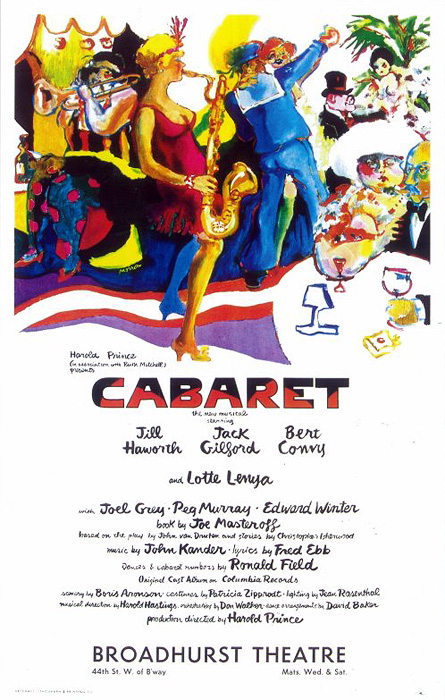
Version 2
Cabaret (1966-11-Original Broadway Run)
Type de série: Original BroadwayThéâtre: Broadway Run (Broadway - Etats-Unis)Durée : 2 ans 9 mois 3 semaines Nombre : 21 previews - 1165 représentationsPremière Preview : 02 November 1966
Première: 20 November 1966
Dernière: 06 September 1969Mise en scène : Harold Prince • Chorégraphie : Ron Field • Producteur : Star(s) : Commentaires longs: Broadhurst Theatre (20/11/1966 -4/3/1967)
Imperial Theatre (7/3/1967 - 2/10/1968) -
Broadway Theatre (7/10/1968 - 6/9/1969)
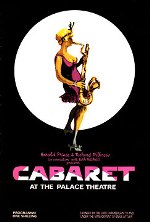
Version 3
Cabaret (1968-02-Palace Theatre-London)
Type de série: Original LondonThéâtre: Palace Theatre (Londres - Angleterre) Durée : Nombre : 336 représentationsPremière Preview : Inconnu
Première: 26 February 1968
Dernière: InconnuMise en scène : Harold Prince • Chorégraphie : Producteur : Star(s) :
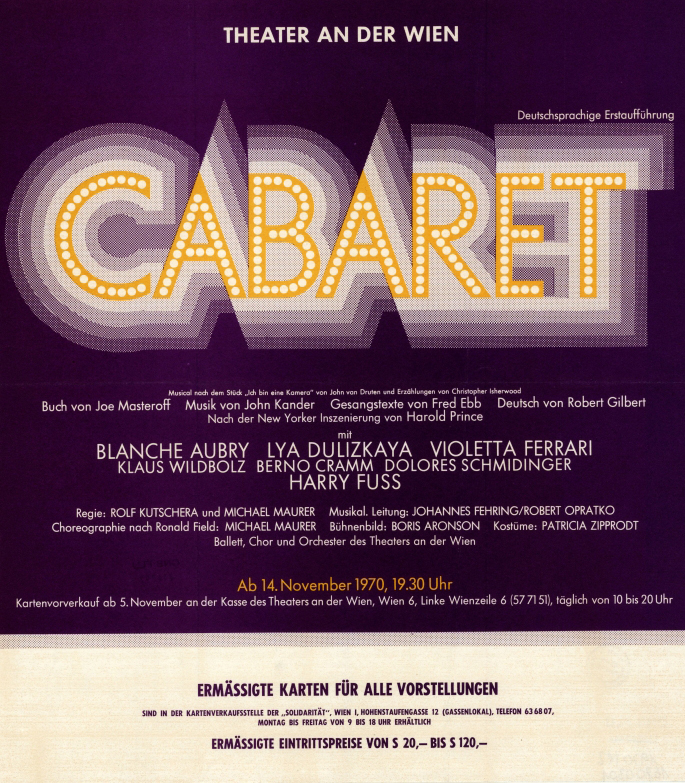
Version 4
Cabaret (1970-11-Theater an der Wien-Wien)
Type de série: RevivalThéâtre: Theater an der Wien (Vienne - Autriche) Durée : Nombre : 59 représentationsPremière Preview : 14 November 1979
Première: 14 November 1970
Dernière: InconnuMise en scène : Rolf Kutschera • Michael Maurer • Chorégraphie : Ron Field • Producteur : Star(s) :
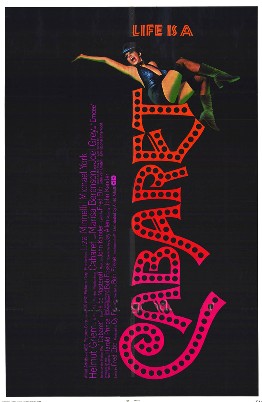
Version 5
Cabaret (1972-02-Film)
Type de série: FilmThéâtre: *** Film (*** - ***) Durée : Nombre : Première Preview : 13 February 1972
Première: 13 February 1972
Dernière: 13 February 1972Mise en scène : Bob Fosse • Chorégraphie : Bob Fosse • Producteur : Star(s) : Commentaires longs: The film is significantly different from the Broadway musical. To accommodate Minnelli, Sally Bowles is Americanized. The character of Cliff Bradshaw was renamed Brian Roberts and made British, though he still remained bisexual. The characters, and plot lines involving, Fritz, Natalia and Max do not exist in the play (although there is a minor character named Max in the stage version, the owner of the Kit Kat Club, who bears no relation to the character in the film). The Broadway version used special settings to separate the fantasy world of the Cabaret from the darker rest of the world.
Fosse cut several of the songs, leaving only those that are sung within the confines of the Kit Kat Klub, and "Tomorrow Belongs to Me" - sung in a beer garden, though in the stage play it is sung first by the cabaret boys and then at a private party. Kander and Ebb wrote several new songs for the movie and removed others; "Don't Tell Mama" was replaced by "Mein Herr," and "The Money Song" (retained in an instrumental version as "Sitting Pretty") was replaced by "Money, Money." Interestingly, "Mein Herr" and "Money, Money," which were composed for the film version, have, due to their popularity, now been added to performances of the stage musical alongside the original numbers. The song "Maybe This Time," which Sally performs at the cabaret, was not written for the film. Kander and Ebb had written it years earlier (for their unproduced musical Golden Gate), thus making it ineligible for an Academy Award nomination. Though "Don't Tell Mama" and "Married" were removed as performed musical numbers, both appeared in the film. The former's bridge section appears as instrumental music played on Sally's gramophone; the latter is initially played on the piano in Fraulein Schneider's parlor and later heard on Sally's gramophone in a German translation ("Heiraten") sung by cabaret singer Greta Keller.
Several characters were cut from the film (including Herr Schultz, with Fraulein Schneider's part greatly reduced and the whole romantic subplot removed) and several from Isherwood's original stories put back in. The entire score was re-orchestrated, with all the numbers being accompanied by the stage band.
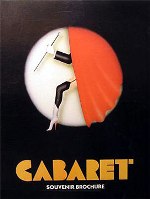
Version 6
Cabaret (1986-07-Strand Theatre-London)
Type de série: RevivalThéâtre: Novello Theatre (Londres - Angleterre) Durée : 9 mois 2 semaines Nombre : 329 représentationsPremière Preview : Inconnu
Première: 17 July 1986
Dernière: 01 May 1987Mise en scène : Gillian Lynne • Chorégraphie : Gillian Lynne • Producteur : Star(s) : Avec: Kelly Hunter (Sally Bowles), Wayne Sleep (MC), Peter Land (Clifford),
Vivienne Martin (Fraulein Schneider), Oscar Quitak {Herr Schultz), Rodney Cottam (Ernst Ludwig)Commentaires : The show initially received luke-warm reviews, but it attracted reasonable audiences. There were rumours of a number of backstage squabbles, and at the end of February Toyah Wilcox was brought in to replace Kelly Hunter. The show suddenly closed on Friday May 1st 1987 after a strike following the sacking of five out of the 13 orchestra members. The show had been blighted with a number of difficulties, including a serious breakdown in the orchestra’s relationship with Wayne Sleep, who accused them of interfering with his performance and alleged they were guilty of drunken and bawdy behaviour. The final performance (Friday May 1st 1987) was played with no musicians, and subsequent negotiations failed to resolve the problem. After the show ended a whole series on unpaid bills came to light, and 3 years later the main backer, William Hancock, was declared bankrupt with total debts of over £5 million.
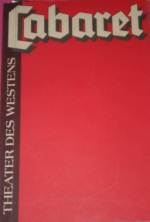
Version 7
Cabaret (1987-??-Theater des Westens-Berlin)
Type de série: RevivalThéâtre: Theater des Westens (Berlin - Allemagne) Durée : Nombre : Première Preview : Inconnu
Première: Inconnu
Dernière: InconnuMise en scène : Helmut Baumann • Chorégraphie : ???? ???? • Producteur : Star(s) : Commentaires longs: Le musical qui a vu les débuts à la scène de Helen Schneider. Regie: Helmut Baumann, mit Helen Schneider als Sally Bowles, Wolfgang Reichmann als Conférencier, Hildegard Knef als Frl. Schneider und Utz Richter als Herr Schultz
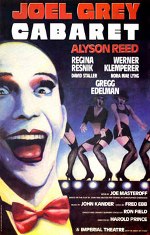
Version 8
Cabaret (1987-10-Broadway Run-Broadway)
Type de série: RevivalThéâtre: Broadway Run (Broadway - Etats-Unis)Durée : Nombre : Première Preview : 07 October 1987
Première: 22 October 1987
Dernière: 04 June 1988Mise en scène : Harold Prince • Chorégraphie : Producteur : Star(s) : Commentaires longs: Imperial Theatre (22/10/1987 - 7/2/1988) - Minskoff Theatre (9/2/1988 -4/6/1988)
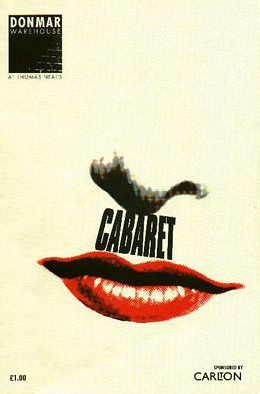
Version 9
Cabaret (1993-12-Donmar Warehouse-London)
Type de série: RevivalThéâtre: Donmar Warehouse (Londres - Angleterre)
Durée : 3 mois 2 semaines Nombre : 124 représentationsPremière Preview : Inconnu
Première: 09 December 1993
Dernière: 26 March 1994Mise en scène : Sam Mendes • Chorégraphie : Lea Anderson • Producteur : Star(s) : Avec: Jane Horrocks (Sally Bowles), Alan Cumming (MC), Adam Godley (Clifford), Sara Kestelman (Fraulein Schneider), George Raistrick (Herr Schultz), Michael Gardiner (Ernst Ludwig)Commentaires : Mendes' conception was a very different show than either the original production or the rather conventional first revival. The most significant change was the character of the Emcee. The role, as played by Joel Grey, in both prior incarnations, was an asexual, malevolent character in a tuxedo with rouged cheeks. Alan Cumming's portrayal was highly sexualized, wearing suspenders (i.e. braces) around his crotch and red paint on his nipples. The cabaret number "Two Ladies" was staged with the Emcee, a cabaret girl, and a cabaret boy in drag and included a shadow play simulating various sexual positions. The score was entirely re-orchestrated, utilizing synthesizer effects and expanding the stage band, with all the instruments now being played by the cabaret girls and boys. The brutally satiric "Sitting Pretty", with its mocking references to deprivation, despair and hunger, was eliminated entirely, as it had been in the film version, and replaced with "Money". "I Don't Care Much", which was cut from the original production, was reinstated, and "Mein Herr" and "Maybe This Time", written for the film adaptation, were added to the score. Staging details differed as well; instead of "Tomorrow Belongs To Me" being performed by a male choir, the Emcee plays a recording of a boy soprano singing it. Most dramatic of all was in the final scene in which the Emcee removes his outer clothes to reveal a striped suit of the type worn by the internees in concentration camps on which were pinned a yellow badge (identifying a Jewish prisoner) and a pink triangle (denoting a homosexual prisoner). Other changes included added references to Cliff's bisexuality, including a brief scene where he kisses one of the Cabaret boys.
Awards:
> 1994 Laurence Olivier Award: Best Supporting Performance in a Musical (Sara Kestelman)
> 1994 Laurence Olivier Award nomination: Best Director of a Musical (Sam Mendes)
> 1994 Laurence Olivier Award nomination: Best Actor in a Musical (Alan Cumming)
> 1994 Laurence Olivier Award nomination: Best Musical Revival (Cabaret)
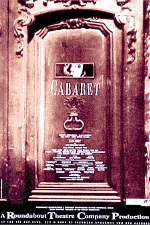
Version 12
Cabaret (1998-03-Broadway Run-Broadway)
Type de série: RevivalThéâtre: Broadway Run (Broadway - Etats-Unis)Durée : Nombre : 37 previews - 2377 représentationsPremière Preview : 13 February 1998
Première: 19 March 1998
Dernière: 04 January 2004Mise en scène : Sam Mendes • Chorégraphie : Lea Anderson • Producteur : Star(s) : Commentaires longs: Joué au: Kit Kat Klub (19/3/1998 - 8/11/1998) - Studio 54 (12/11/1998 - 4/1/2004)
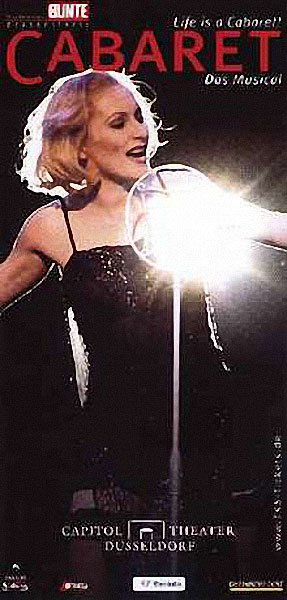
Version 13
Cabaret (1999-12-Capitol Theater-Dusseldorf)
Type de série: RevivalThéâtre: Capitol Theater (Dusseldorf - Allemagne) Durée : 1 an 1 mois 4 semaines Nombre : Première Preview : Inconnu
Première: 04 December 1999
Dernière: 31 January 2001Mise en scène : Alexander Balga • Chorégraphie : Producteur : Star(s) : Presse : "Klug auf jede Kopie des Originals verzichtet. Cabaret: Begeisterungsstürme und Standing Ovations." Die Welt
"Keine Sekunde Langeweile. Hervorragend!" Bild
"Jubel im Capitol-Club. Ein durchweg hochklassiges Ensemble, bestens aufgelegte Musiker und eine gelungene Regiearbeit." Express
"Eine spannende Neuinszenierung mit hervorragenden Darstellern. Das Orchester spielt hinter silbernen Lametta-Vorhängen, die Lichterketten erstrahlen aus den großen Wandspiegeln des Capitol Theaters in doppelter Pracht, Samt umgibt die Bühne. Es sind viele Kleinigkeiten, die das bekannte Musical spannend machen." Westdeutsche Zeitung
"Da war ein Cabaret. Da war ein Conférencier. Und die Tänzerin Sally. Eine Berliner Geschichte. Herausgekommen ist ein hinreißendes Musical voller unvergesslicher Melodien: Cabaret." Lübecker Nachrichten
"Höchstes Lob für Cabaret: Da stimmte einfach alles! Betörende Stimmen, mitreißende Musik, sexy Kostüme: Die Premiere des Musicals Cabaret im Thalia Theater war ein Riesen-Erfolg. Standing Ovations für das Gastspiel des Düsseldorfer Capitol." Bild Hamburg

Version 15
Cabaret (2002-07-Union Theatre-London)
Type de série: RevivalThéâtre: Union Theatre (Londres - Angleterre) Durée : 2 semaines Nombre : Première Preview : 11 July 2002
Première: 11 July 2002
Dernière: 27 July 2002Mise en scène : Ben De Winter • Chorégraphie : Louise Mitchell • Zoe Wyatt • Producteur : Star(s) : Avec: Stefanie Moore (Sally Bowles), Marc Edison (MC), Glynne Steele (Clifford), Susan Travers (Fraulein Schneider), Stephan Dunbar {Herr Schultz), Andrew Obeney (Ernst Ludwig)Commentaires : This was an even harsher interpretation than the 1993 Donmar revival and was much praised during its very short limited run.
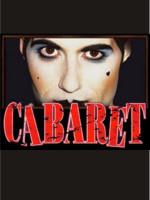
Version 16
Cabaret (2006-02-Carré-Amsterdam)
Type de série: RevivalThéâtre: Carré (Koninlijk Theater) (Amsterdam - Pays-Bas) Durée : Nombre : Première Preview : 04 February 2006
Première: 14 February 2006
Dernière: 02 July 2006Mise en scène : Chorégraphie : Producteur : Star(s) : Commentaires longs: Magnifique version où tout le Carré Theater d'Amsterdam a été transformé en Lit Kat Club!!!!
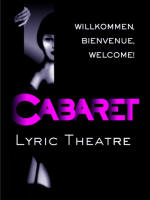
Version 17
Cabaret (2006-09-Lyric Theatre-London)
Type de série: RevivalThéâtre: Lyric Theatre (Londres - Angleterre) Durée : 1 an 8 mois 2 semaines Nombre : 704 représentationsPremière Preview : 23 September 2006
Première: 10 October 2006
Dernière: 21 June 2008Mise en scène : Rufus Norris • Chorégraphie : Javier De Frutos • Producteur : Star(s) : Avec: Anna Maxwell Martin (Sally Bowles), James Dreyfuss (Emcee), Michael Hayden (Clifford), Sheila Hancock (Fräulein Schneider), Geoffrey Hutchings (Herr Schultz), Andrew Maud (Ernst Ludwig), Harriet Thorpe (Fräulein Kost).
Later replacements were Kim Medcalf and Amy Nuttall as Sally, Julian Clary and Alistair McGowan as the Emcee, and Honor Blackman and Angela Richards as Fraulein Schneider.Commentaires : This was, to date, the darkest and most gritty interpretation of “Cabaret”. During “Tomorrow Belongs to Me”, sung by a fresh-voiced Aryan youth, the company cavorted nude like the naturists of the period. In the finale the same
naked dancers piled up on top of each other in the gas chambers. This compelling, fearless and frank production was not to everyone’s taste, but it ran the best part of two years, and won an Olivier Award for Sheila Hancock. It closed on June 21st 2008.Presse : NICHOLAS DE JONGH for THE EVENING STANDARD says, "Inventive, musically vigorous production." PAUL TAYLOR for THE INDEPENDENT says, "Rufus Norris's production of the Kander/Ebb classic is the most stunningly fresh and imaginative revival of a classic musical that I have ever seen." MICHAEL BILLINGTON for THE GUARDIAN says, "Forty years after its premiere, Cabaret increasingly looks like one of the defining musicals of the postwar era." BENEDICT NIGHTINGALE for THE TIMES says, "Sensuality is missing." CHARLES SPENCER for THE DAILY TELEGRAPH says, "This is a strong and daring revival of a great musical that combines unforgettable songs with genuinely gripping and disturbing drama."
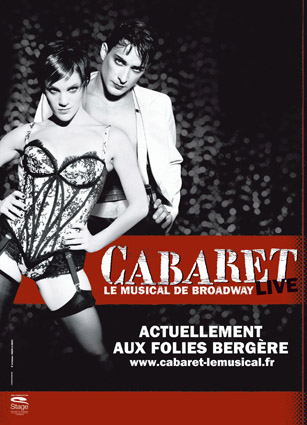
Version 18
Cabaret (2006-10-Folies Bergères-Paris)
Type de série: RevivalThéâtre: Folies Bergères (Les) (Paris - France) Durée : 1 an 3 mois Nombre : 450 représentationsPremière Preview : 14 October 2006
Première: 26 October 2006
Dernière: 27 January 2008Mise en scène : Sam Mendes • Chorégraphie : Producteur : Star(s) : Avec: Claire Pérot (Sally Bowles), Fabian Richard (MC, le Maître de Cérémonie), Catherine Arditi (Fraulein Schneider), Pierre Reggiani (Herr Schultz), Delphine Grandsart (Fraulein Kost), Geoffroy Guerrier (Cliff Bradshaw), Patrick Mazet (Ernst Ludwig), …Commentaires : 6 nominations aux Molières en 2007 et 1 nomination en 2008...
Pour cette première production, Stage Entertainment France relève son défi avec succès, celui de présenter en France, avec une équipe française, un musical aux standards de Broadway. Ce n’est certainement pas dans ces colonnes que l’on doutera du vivier de talents que l’on peut trouver en France mais en tout cas, Cabaret prouvera aux sceptiques que le théâtre musical parisien a de belles heures devant lui, reste à espérer que le public répondra à l’appel.
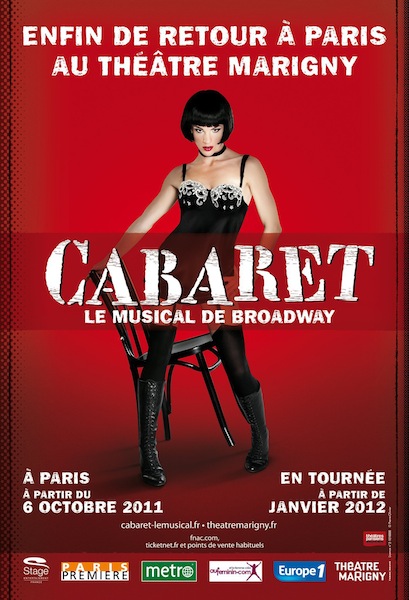
Version 19
Cabaret (2011-10-Theatre Marigny-Paris)
Type de série: RevivalThéâtre: Théâtre Marigny (Paris - France) Durée : 3 mois Nombre : Première Preview : Inconnu
Première: 06 October 2011
Dernière: 08 January 2012Mise en scène : Sam Mendes • Chorégraphie : Rob Marshall • Producteur : Star(s) : Avec: Emmanuel Moire (Emcee), Claire Pérot (Sally Bowles), Geoffroy Guerrier (Cliff Bradshaw), Patrick Mazet (Ernst Ludwig), Catherine Arditi (Fraulein Schneider), Pierre Reggiani (Herr Schultz), Delphine Grandsart (Fraulein Kost)Commentaires : Après avoir accueilli 350.000 spectateurs aux Folies Bergère (2006-2008), le célèbre musical CABARET s'apprête à créer l'évènement à la rentrée 2011 lors d'un retour exceptionnel à Paris au Théâtre Marigny avant de partir pour la première fois en tournée dans toute la France.
Véritable succès public à Paris, il a été récompensé par 6 nominations aux Molières en 2007 et 1 nomination en 2008. CABARET reprend du service et s'apprête à devenir l'un des évènements de la rentrée théâtrale 2011.
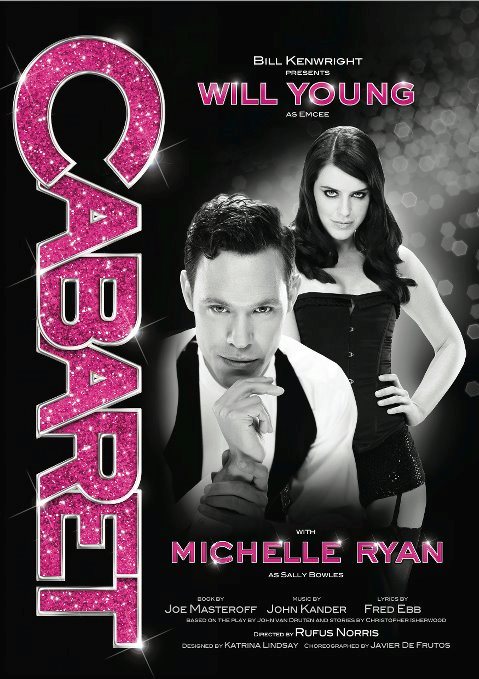
Version 20
Cabaret (2012-09-UK Tour)
Type de série: UK TourThéâtre: UK Tour ( - Angleterre) Durée : 4 mois 2 semaines Nombre : Première Preview : 01 September 2012
Première: 01 September 2012
Dernière: 19 January 2013Mise en scène : Rufus Norris • Chorégraphie : Javier De Frutos • Producteur : Star(s) : Avec: Michelle Ryan (Sally Bowles), Will Young (Emcee), Sian Phillips (Fraulein Schneider), Harriet Thorpe (Fraulein Kost), Matt Rawle (Cliff), Linal Haf (Herr Schultz), Nicholas Tizzard (Ernst), John Brannoch; Jessica Ellen; Allessia Lugoboni; Edd Mitton; Ian Parsons; Nuno Silva; Rebecca Sutherland; Shahla Tarrant; Laura Tyrer; Cydney Uffindell-Phillips, Matthew Wesley.Commentaires : 3 Oct 12 to 19 Jan 13 - Savoy Theatre, London
24 Sep 12 to 29 Sep 12 The Lowry, Salford
17 Sep 12 to 22 Sep 12 Theatre Royal, Norwich
10 Sep 12 to 15 Sep 12 Theatre Royal, Nottingham
3 Sep 12 to 8 Sep 12 Mayflower Theatre, Southampton
30 Aug 12 to 1 Sep 12 Churchill Theatre, Bromley

Version 21
Cabaret (2012-10-Savoy Theatre-London)
Type de série: RevivalThéâtre: Savoy Theatre (Londres - Angleterre) Durée : 3 mois 1 semaine Nombre : Première Preview : 03 October 2012
Première: 09 October 2012
Dernière: 19 January 2013Mise en scène : Rufus Norris • Chorégraphie : Javier De Frutos • Producteur : Star(s) : Avec: Michelle Ryan (Sally Bowles), Will Young (Emcee), Sian Phillips (Fraulein Schneider), Harriet Thorpe (Fraulein Kost), Matt Rawle (Cliff), Linal Haf (Herr Schultz), Nicholas Tizzard (Ernst), John Brannoch; Jessica Ellen; Allessia Lugoboni; Edd Mitton; Ian Parsons; Nuno Silva; Rebecca Sutherland; Shahla Tarrant; Laura Tyrer; Cydney Uffindell-Phillips, Matthew Wesley.Commentaires : Il s'agit de la fin à Londres de l'UK-Tour de 2012.
This was a revival of the dark and disturbing production which had a much praised two year run in 2006. For this revival several of the numbers had been re-staged with different choreography, and some critics felt it had lost some of its power and ability to shock. The performance of “pop-idol” Will Young, in his West End, was acclaimed, and there was much praise for Sian Phillips and Linai Haft.Presse : "The chilling descent into Nazi nightmare isn’t realised with enough intensity. The central relationships don’t fully convince, and there is a lack of sensuality." - Henry Hitchings for The Evening Standard
"The final 20 minutes of Rufus Norris's revamped revival of Cabaret are shockingly good." - Michael Billington for The Guardian
"Patchy but inventive production." - Charles Spencer for The Daily Telegraph

Version 22
Cabaret (2014-04-Studio 54-Broadway)
Type de série: RevivalThéâtre: Studio 54 (Broadway - Etats-Unis) Durée : 11 mois 1 semaine Nombre : Première Preview : 21 March 2014
Première: 24 April 2014
Dernière: 29 March 2015Mise en scène : Sam Mendes • Chorégraphie : Rob Marshall • Producteur : Star(s) : Avec: Alan Cumming (Emcee), Michelle Williams (Sally Bowles), Bill Heck (Clifford Bradshaw), Aaron Krohn (Ernst Ludwig), Linda Emond (Fraulein Schneider), Gayle Rankin (Fraulein Kost), Danny Burstein (Herr Schultz), Jane Pfitsch (Rosie (Kit Kat Girl)), Kaleigh Cronin (Lulu (Kit Kat Girl)), Andrea Goss (Frenchie (Kit Kat Gir))

Version 23
Cabaret (2014-09-Théâtre Le Public au TN-Bruxelles)
Type de série: RevivalThéâtre: Théâtre Le Public (Bruxelles - Belgique) Salle : Grande salleDurée : 2 semaines Nombre : Première Preview : 11 September 2014
Première: 11 September 2014
Dernière: 01 October 2014Mise en scène : Mi chel Kacenelenbogen • Chorégraphie : Thierry Smits • Producteur : Star(s) : Avec: Taïla Onraedt (Sally), Steve Beirnaert (Emcee), Baptiste Blampain (Cliff), Guy Pion, Delphine Gardin, Daphné D’Heur, Nitya Fierens, Jolijn Antonissen, Léonor Bailleul, Antoine Guillaume, Steven Colombeen, Damien Locqueneux, Bruno Mullenaerts, Floriane Jamar, Anthony Sourdeau, Sarah DelforgeCommentaires : Pour fêter ses 20 ans, le Public présente, en collaboration avec le Théâtre National, le plus grand classique des Music-halls !
CABARET EN TOURNÉE:
Théâtre National, du 11/09 au 1/10/2014
Maison de la culture d’Arlon, les 19 et 20/11/2014
Théâtre de Liège, du 19 au 31/12/2014
Centre culturel de l’Arrondissement de Huy, le 22/01/2015
Théâtre de Namur, du 27 au 31/01/2015
Théâtre du Passage (Neuchâtel), du 6/02 au 9/02/2015
Nuithonie-Equilibre (Fribourg), les 13 et 14/02/2015
Louvain-la-Neuve - Aula Magna du 3/03 au 8/03/2015

Version 24
Cabaret (2014-11-Théâtre Le Public au TN-Bruxelles)
Type de série: RepriseThéâtre: Théâtre Le Public (Bruxelles - Belgique) Salle : Grande salleDurée : 1 semaine Nombre : Première Preview : 10 December 2015
Première: 10 December 2015
Dernière: 20 December 2015Mise en scène : Mi chel Kacenelenbogen • Chorégraphie : Thierry Smits • Producteur : Star(s) : Avec: Taïla Onraedt (Sally), Steve Beirnaert (Emcee), Baptiste Blampain (Cliff), Guy Pion (Herr Schultz), Delphine Gardin (Fraulein Schneider), Nitya Fierens (Fraulein Kost), Jolijn Antonissen, Léonor Bailleul, Antoine Guillaume, Steven Colombeen, Damien Locqueneux, Bruno Mullenaerts, Floriane Jamar, Anthony Sourdeau et Sarah Delforge.Commentaires : Reprise à Bruxelles.

Version 25
Cabaret (2014-11-Théâtre Le Public au TN-Bruxelles)
Type de série: RepriseThéâtre: Théâtre Le Public (Bruxelles - Belgique) Salle : Grande salleDurée : 1 semaine Nombre : Première Preview : 27 November 2014
Première: 27 November 2014
Dernière: 07 December 2014Mise en scène : Mi chel Kacenelenbogen • Chorégraphie : Thierry Smits • Producteur : Star(s) : Avec: Taïla Onraedt (Sally), Steve Beirnaert (Emcee), Baptiste Blampain (Cliff), Guy Pion, Delphine Gardin, Daphné D’Heur, Nitya Fierens, Jolijn Antonissen, Léonor Bailleul, Antoine Guillaume, Steven Colombeen, Damien Locqueneux, Bruno Mullenaerts, Floriane Jamar, Anthony Sourdeau, Sarah DelforgeCommentaires : Reprise à Bruxelles.

Version 26
Cabaret (2014-11-Théâtre Le Public au TN-European Tour)
Type de série: RepriseThéâtre: Théâtre Le Public (Bruxelles - Belgique) Salle : Grande salleDurée : 2 mois Nombre : Première Preview : 03 November 2017
Première: 03 November 2017
Dernière: 05 January 2018Mise en scène : Mi chel Kacenelenbogen • Chorégraphie : Thierry Smits • Producteur : Star(s) : Avec: Taïla Onraedt (Sally), Antoine Guillaume (Emcee), Baptiste Blampain (Cliff Bradshaw), Didier Colfs (Herr Schultz), Delphine Gardin (Fraulein Schneider), Nitya Fierens (Fraulein Kost), Samuel Anastasi, Jolijn Antonissen, Léonor Bailleul, Steven Colombeen, Sarah Delforge, Floriane Jamar, Damien Locqueneux, Jeroen Logghe, Bruno Mullenaerts, ...Commentaires : Aula Magna - Louvain-La-Neuve : du 03, 04 et 07.11.17
Grand Théâtre de Provence - Aix en Provence (F) : du 17 au 19.11.17
Maison de la danse - Lyon (F) : du 23.11 au 03.12.17
Le Colisée de Roubaix - Roubaix (F) : du 09 au 10.12.17
Le Quartz - Brest (F) : du 13 au 17.12.17
Théâtre André Malraux - SEMTAM - Rueil-Malmaison (F) : du 21 au 23.12.17
Théâtre de Liège - Liège : du 31.12.17 au 05.01.18

Version 27
Cabaret (2017-11-Aula Magna-Louvain La Neuve)
Type de série: RevivalThéâtre: Aula Magna (Louvain-la-Neuve - Belgique) Durée : Nombre : Première Preview : 03 November 2017
Première: 03 November 2017
Dernière: 07 November 2017Mise en scène : Mi chel Kacenelenbogen • Chorégraphie : Thierry Smits • Producteur : Star(s) : Avec: Taïla Onraedt , Steve Beirnaert, Baptiste Blampain, Guy Pion, Gardin Delphine , Daphné D’Heur, Nitya Fierens, Antoine Guillaume, Jolijn Antonissen, Léonor Bailleul, Steven Colombeen, Sarah Delforge, Floriane Jamar, Damien Locqueneux, Bruno Mullenaerts, Anthony SourdeauCommentaires : La 100 ème

Version 28
Cabaret (2017-12-Salle de la Grande Main-Th de Liège-Liège)
Type de série: RevivalThéâtre: Théâtre de Liège (Liège - Belgique) Salle : Salle de la Grande MainDurée : Nombre : Première Preview : 31 December 2017
Première: 31 December 2017
Dernière: 05 January 2018Mise en scène : Mi chel Kacenelenbogen • Chorégraphie : Thierry Smits • Producteur : Star(s) : Avec: Taïla Onraedt , Steve Beirnaert, Baptiste Blampain, Guy Pion, Gardin Delphine , Daphné D’Heur, Nitya Fierens, Antoine Guillaume, Jolijn Antonissen, Léonor Bailleul, Steven Colombeen, Sarah Delforge, Floriane Jamar, Damien Locqueneux, Bruno Mullenaerts, Anthony SourdeauCommentaires : La 100 ème
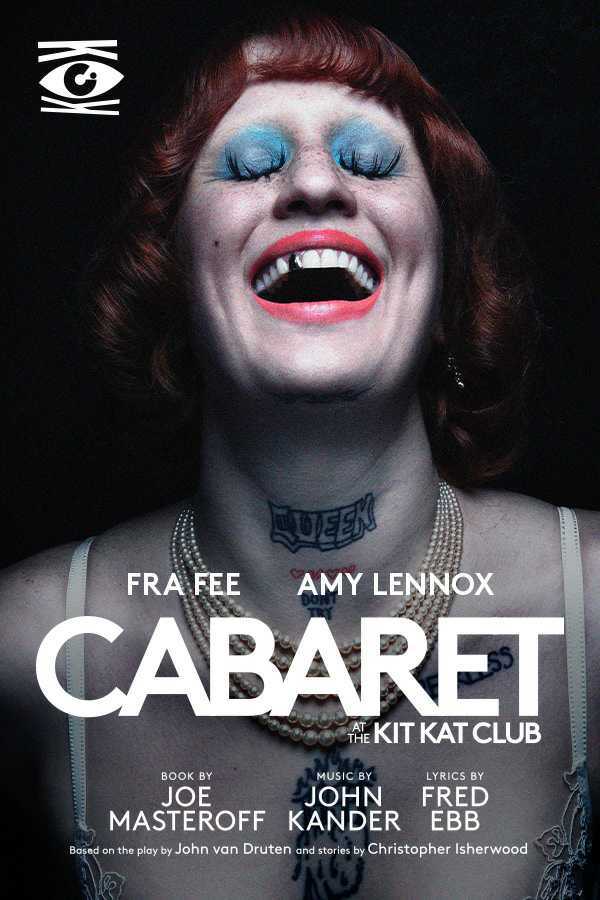
Version 29
Cabaret (2021-11-Playhouse Theatre-London)
Type de série: RevivalThéâtre: Playhouse Theatre (Londres - Angleterre) Durée : Se joue actuellementNombre : Première Preview : 15 November 2021
Première: 15 November 2021
Dernière: Open endMise en scène : Rebecca Frecknell • Chorégraphie : Julia Cheng • Producteur : Star(s) : Avec: Eddie Redmayne (Emcee), Jessie Buckley (Sally Bowles), Omari Douglas (Clifford Bradshaw), Liza Sadovy (Fraulein Schneider), Elliot Levey (Herr Schultz), Stewart Clarke (Ernst Ludwig), Anna-Jane Casey (Fraulein Kost/Fritzi), Josh Andrews, Emily Benjamin, Sally Frith, Matthew Gent, Emma Louise Jones, Ela Lisondra, Theo Maddix, Chris O'Mara, Daniel Perry, Andre Refig, Christopher Tendai, Bethany Terry, Lillie-Pearl Wildman, Sophie Maria Wojna, Gabriela Bendetti (Prologue Company), Rachel Benson (Prologue Company), Laura Braid (Prologue Company), Julian Capole (Prologue Company), Hollie Cassar (Prologue Company), Celine Fortenbacher-Poplawska (Prologue Company), Samantha Ho (Prologue Company), Andrew Linnie (Prologue Company), Sally Swanson (Prologue Company)Commentaires : The Playhouse Theatre is transformed into the Kit Kat Club.
This production offers an exciting chance to discover, or revisit, Kander and Ebb’s still hugely resonant musical. Based on Christopher Isherwood’s short stories and John Van Druten’s play, John Kander, Fred Ebb and Joe Masteroff’s show is set in early 1930s Berlin, where American writer Cliff Bradshaw meets English cabaret singer Sally Bowles, a performer at the Kit Kat Club. But the rise of Nazism threatens this hedonistic Weimar Republic haven.
This new Cabaret West End production promises to be a very special audience experience. The Playhouse is reconfigured to seat viewers in the round, creating more intimacy and immersing us in the action — and limiting capacity to just 550.
Trailer
Cabaret (2014-04-Studio 54-Broadway)
Qualité: ***** Intérêt: **
Langue: Anglais Durée: 0:00:16